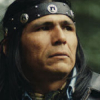Dennis Banks

Dennis Banks
Dennis Banks, a Native American leader, teacher, lecturer, activist and author, is an Anishinaabe born on Leech Lake Indian Reservation in northern Minnesota. Banks is also known as Nowa Cumig. His name in the Ojibwe language means "In the Center of the Universe." He has been a longtime leader of the American Indian Movement, which he co-founded in 1968 with Native Americans in Minneapolis...
NationalityAmerican
ProfessionReligious Leader
Date of Birth12 April 1937
CountryUnited States of America
Rather than point fingers at corporations, we came to the conclusion that we should strengthen our own ceremonies, strengthen what we do.
At the first gathering of the Elders' Circle in 1976, a statement was issued concerning the unique balance between Humankind and our Mother Earth.
When the run is over, there will be a closing ceremony and the runners will return to the many distant lands from which they came.
What we did in the 1960s and early 1970s was raise the consciousness of white America that this government has a responsibility to Indian people. That there are treaties; that textbooks in every school in America have a responsibility to tell the truth. An awareness reached across America that if Native American people had to resort to arms at Wounded Knee, there must really be something wrong. And Americans realized that native people are still here, that they have a moral standing, a legal standing. From that, our own people began to sense the pride.
When we arrived in Japan in 1988, we were not prepared for the overwhelming support shown to us.
Many young Japanese were hearing for the first time the words of Native people from the West.
In 1967 the last Unity Caravan was held.
It is an understanding with the Great Spirit or Creator that we will follow these ways.
Then a strong bond develops as they ride together, pray together, eat meals together, and gather in the evening remembering the day's run.
In 1990 we ran across Europe through 13 countries and covering 7,130 miles.
An awareness reached across America that if Native American people had to resort to arms at Wounded Knee, there must really be something wrong.
I would like to be a spectator today, but they gave me a t-shirt and they gave me some sticks and I'll probably get in there one play, but I'm not a player.
We're bringing hope. I think that's all that we can do. And somebody was caring for them. There's a lot of people been down there that are bringing hope and we were just one of them.
For 27 years, it meant only one thing. And we carry a message about the life on this planet and the quality of it is sacred. Very simple, but sometimes complex.